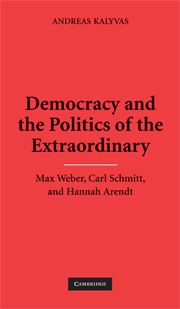Book contents
- Frontmatter
- Contents
- Acknowledgments
- List of Abbreviations
- Introduction: The Extraordinary and Political Theory
- I CHARISMATIC POLITICS AND THE SYMBOLIC FOUNDATIONS OF POWER
- II THE EXCEPTION AND CONSTITUTIONAL POLITICS
- III TAMING THE EXTRAORDINARY
- 7 Extraordinary Beginnings I: Arendt's Critique of Schmitt
- 8 Extraordinary Beginnings II: Arendt's Response to Schmitt
- 9 The Republic of Councils: Beyond Democracy and Liberalism?
- Conclusion: A Democratic Theory of the Extraordinary
- Bibliography
- Index
- References
9 - The Republic of Councils: Beyond Democracy and Liberalism?
Published online by Cambridge University Press: 04 August 2010
- Frontmatter
- Contents
- Acknowledgments
- List of Abbreviations
- Introduction: The Extraordinary and Political Theory
- I CHARISMATIC POLITICS AND THE SYMBOLIC FOUNDATIONS OF POWER
- II THE EXCEPTION AND CONSTITUTIONAL POLITICS
- III TAMING THE EXTRAORDINARY
- 7 Extraordinary Beginnings I: Arendt's Critique of Schmitt
- 8 Extraordinary Beginnings II: Arendt's Response to Schmitt
- 9 The Republic of Councils: Beyond Democracy and Liberalism?
- Conclusion: A Democratic Theory of the Extraordinary
- Bibliography
- Index
- References
Summary
One of the most frequent objections against Arendt's political theory, shared by friends and critics alike, is her alleged neglect of normal, constituted politics. Margaret Canovan, one of the first to articulate this objection, complains that “it is unfortunate that the same concern for rare events that gave her the unparalleled insight into extraordinary politics should have led her to overlook normal politics altogether.” Honig reiterates this criticism: “Lodged in the same opposition of ordinary versus extraordinary discourse as Austin's, Arendt's account reverses Austin's valuation and privileges not the ordinary but the extraordinary, celebrating the latter's exceptional and rule-resistant character.…Indeed, Arendt's exclusion of the ordinary from her account of action leaves her open to the same sort of criticism Derrida levels at Austin for excluding the extraordinary from his.” Similarly, for Kateb, “Arendt's talents are best engaged by what is extraordinary, not by the normal.”
These criticisms raise a crucial issue regarding Arendt's theory. A comprehensive theory of the extraordinary, unlike Weber's but like Schmitt's, must take into account not only the first moment of the original founding but also the second one, that of the stabilization and conservation of the constituent compact. A purported inability to incorporate the second moment into a broader theory of extraordinary politics could take Arendt directly back to the limitations and aporias of Weber's theory of charismatic legitimacy, leaving us with a radical but also ephemeral, and thus impotent, instituting power. Is this what happened?
- Type
- Chapter
- Information
- Democracy and the Politics of the ExtraordinaryMax Weber, Carl Schmitt, and Hannah Arendt, pp. 254 - 291Publisher: Cambridge University PressPrint publication year: 2008



